8 Best Drinks for Better Sleep
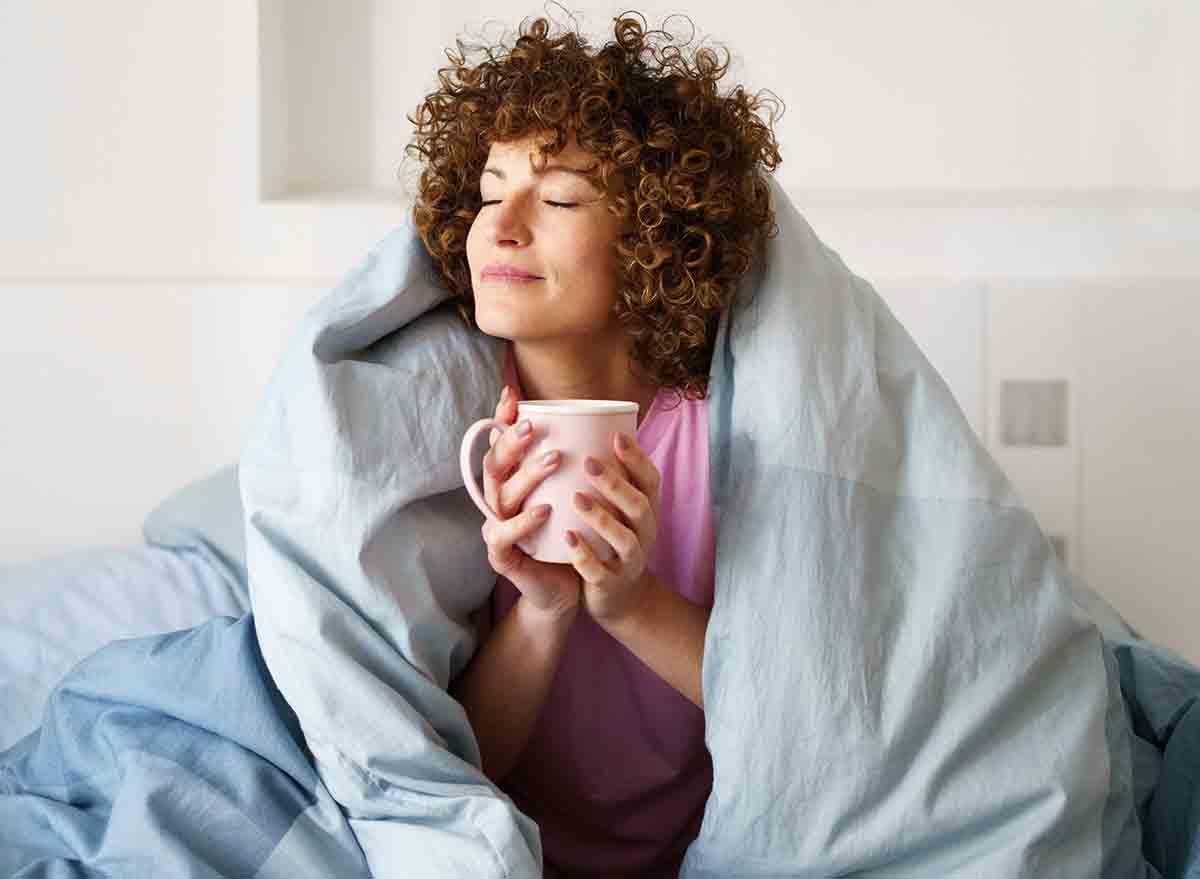
Whether you struggle to fall asleep or wake up at all hours of the night, you’re not alone if you find it difficult to get a good night’s sleep. According to the CDC, a third of adults in the U.S. aren’t getting the recommended minimum of seven hours of sleep nightly. Side effects of poor sleep include more than just low energy, although that by itself is enough to make us crave a good night’s rest.
A June 2015 Consensus Statement published in the Sleep Research Society journal says that regularly getting less than the recommended 7 hours of sleep each night is associated with health effects like weight gain, diabetes, high blood pressure, heart disease, stroke, and depression. Your immune system, performance, and ability to concentrate also take a hit.
While there are plenty of tips to get a better night’s rest that include things like putting your phone away and establishing a relaxing bedtime routine, you can also take advantage of the power of nutrition to support your sleep efforts. You may already know what drinks or foods will sabotage your sleep, like caffeine and fatty or spicy foods, but there are plenty of beverages and foods to support a good night’s sleep that you’ll want to keep a steady stock of.
We spoke with dietitians and read up on the latest studies to find the best nighttime beverages to support a restful slumber. Keep reading for the eight best drinks for better sleep!
Tart cherry juice
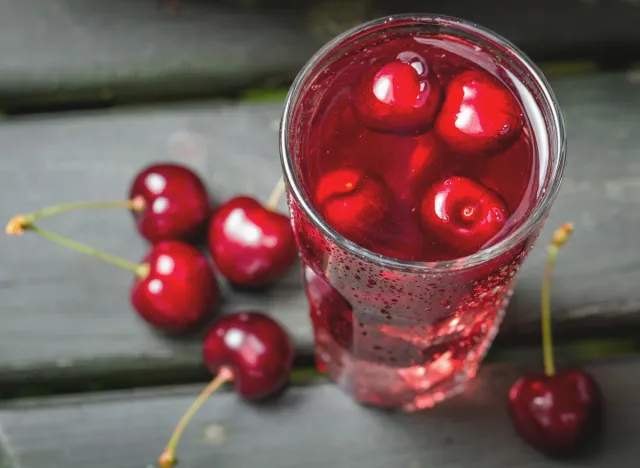
“Montmorency tart cherries, the specific cherries found in tart cherry juice, contain melatonin, which helps regulate our natural sleep patterns,” says Leah Reitmayer MS, RD, CSSD, LDN owner of Lettuce Eat Dessert.
A small study on adults with insomnia found that drinking one cup of cherry juice two times a day increased sleep time by 84 minutes compared to the test period with a placebo. While tart cherries contain melatonin, this study also found that drinking cherry juice increased the availability of tryptophan, an amino acid that works with melatonin to support sleep.
Chamomile tea
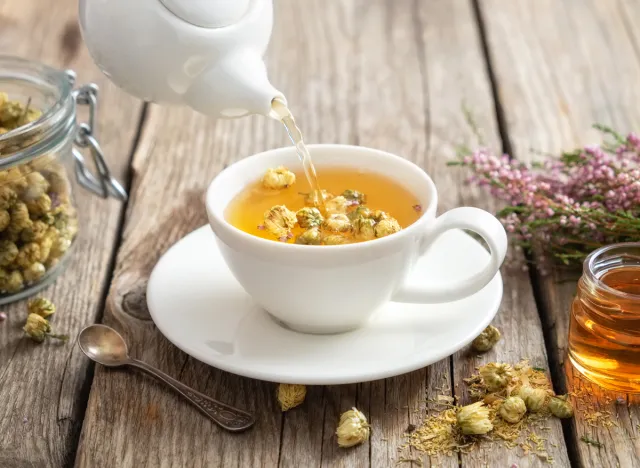
This herbal tea is naturally caffeine-free and has relaxing properties that could help you ease into a slumber if you have trouble turning your mind and worries off at night. An April 2019 review in Phytotherapy Research found that chamomile was effective at improving generalized anxiety disorder symptoms and resulted in improved sleep quality. Chamomile is also a digestive relaxant, which could help ease stomach issues like gas, bloating, or indigestion, all of which are common sleep disruptors.
Almond milk
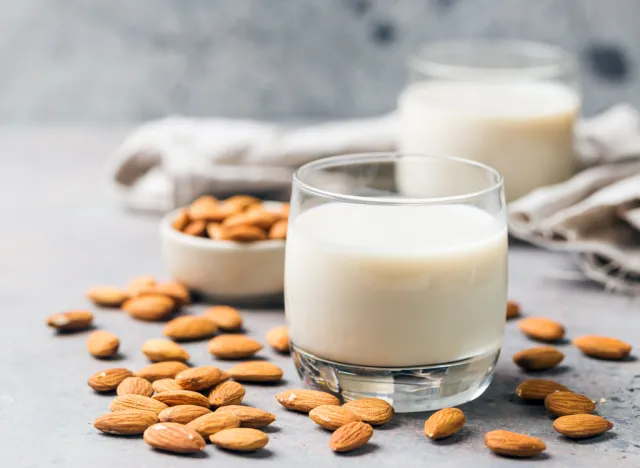
“Almond milk is an excellent sleep-inducing beverage, backed by science showing that serotonin present in the brain can help initiate sleep,” says Cheryl Mussatto MS, RD, LD, a clinical dietitian. “Serotonin levels in our central nervous system are highly dependent on tryptophan, an amino acid naturally present in both cow’s milk and almond milk,” adds Mussatto.
While almonds contain tryptophan, they’re also a source of other sleep-promoting nutrients like melatonin and magnesium, with one cup of almond milk contributing 17 milligrams of magnesium, or 4 percent of the daily value (DV).
Decaf green tea
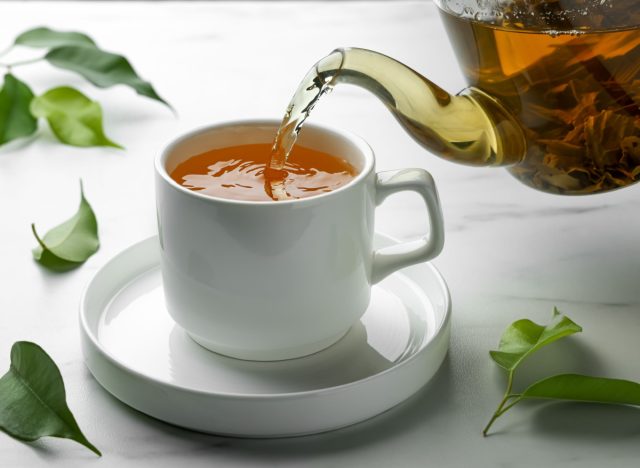
The health benefits of green tea steep into a good night’s sleep, as long as you’re drinking decaf. “Not only is green tea high in antioxidants, which help repair and protect cells, but the l-theanine in green tea has also been shown to decrease stress and anxiety, promoting more relaxing sleep, especially in terms of the speed of falling asleep,” says Alyssa Simpson RDN, CGN, CLT, owner of Nutrition Resolution in Phoenix, AZ.
A small October 2019 study published in Nutrients found that adults who took 200 milligrams of l-theanine daily had reduced sleep latency, sleep disturbance, and use of sleep medication compared to the placebo group. While a standard cup of green tea only has around 8 milligrams of l-theanine, drinking it throughout the evening may provide sleep-promoting benefits.
Milk
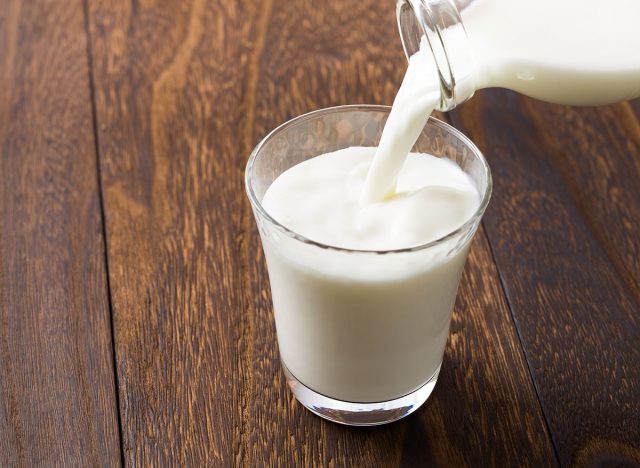
As it turns out, there’s some truth to the age-old sleep antidote of drinking a glass of warm milk before bed. “While the calcium in milk is great for our bones and heart health, it has an important part in producing the sleep-promoting hormone, melatonin,” says Karman Meyer, a registered dietitian and author of Eat To Sleep: What To Eat & When To Eat It for a Good Night’s Sleep.
“A glass of milk also contains magnesium and potassium, which can help ease muscle cramping, a common cause of sleep disturbances, especially in older adults,” says Meyer. One 16-ounce glass of low-fat milk has 13 percent the DV of magnesium and 16% the DV of potassium.
Ashwagandha tea
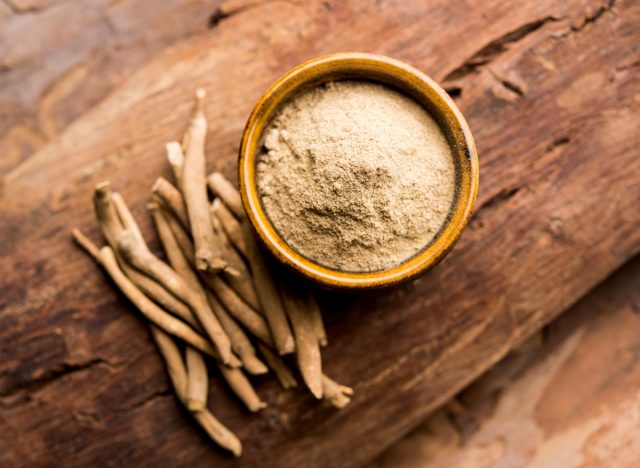
Drinking a cup of Ashwagandha tea or adding ashwagandha extract to your nightly beverage could help improve your sleep in the long run. As an herb that’s been used for easing stress and inducing sleep for years, recent research has shown that ashwagandha may benefit sleep for those with mild sleep disturbances and people with insomnia by reducing the time it takes to fall asleep, improving restful sleep time, and overall time of sleep.
This study was conducted over an eight-week period, and most research involving the benefits of this herb takes place over several weeks to several months, indicating that the benefits are not felt immediately but over a longer period of use.
Kefir
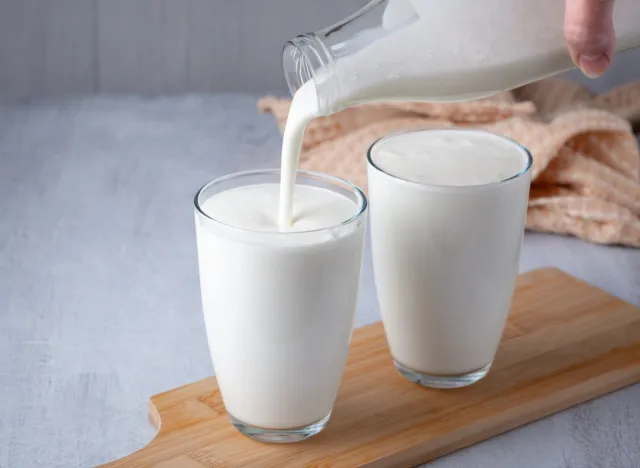
This tangy-tasting yogurt drink has plenty of sleep-promoting properties, from amino acids, including tryptophan, to billions of bacteria that support a healthy gut microbiome. According to an October 2019 study in PLoS One, a diverse gut microbiome is associated with increased sleep efficiency and total sleep time. This is likely related to the fact that specific gut bacteria can create serotonin, a chemical messenger that promotes sleep.
“Kefir is not only a natural source of tryptophan, a precursor to both serotonin and melatonin, but is also rich in probiotics to maintain the diversity of good bacteria in the gut to help regulate cytokine response and serotonin production,” says Caroline Margolis, RDN, registered dietitian and ambassador for Lifeway Foods. If you’re not sure how to enjoy this tangy drink, try it in a bedtime smoothie, over cold cereal, or mixed into a bowl of hot oats.
Golden Milk
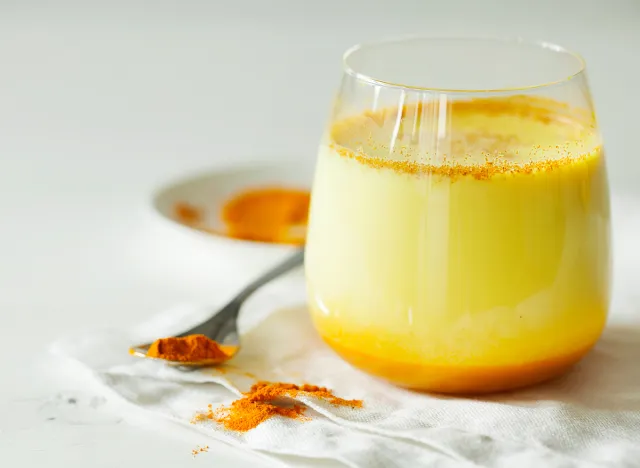
To add even more sleepy benefits to your nightly glass of warm milk, try adding a little turmeric, ginger, and honey to enjoy a soothing glass of golden milk. With the benefits of tryptophan, magnesium, and potassium from milk, you also get the digestive soothing properties of ginger and curcumin to fight inflammation.
While easing inflammation could help improve overall sleep, turmeric may have another sleep-inducing quality. A July 2021 animal study in Molecular Nutrition and Food Research found that turmeric extract increased non-rapid eye movement (non-REM) sleep in mice in a way that was similar to Doxepin, a drug used for treating insomnia. This discovery may lead to more research on turmeric’s direct effect on sleep in humans, which has yet to be determined.
- Source: Centers for Disease Control and Prevention: Sleep & Sleep Disorders
- Source: Watson, Nathaniel F et al. “Recommended Amount of Sleep for a Healthy Adult: A Joint Consensus Statement of the American Academy of Sleep Medicine and Sleep Research Society.” Sleep vol. 38,6 843-4. 1 Jun. 2015.
- Source: Losso, Jack N et al. “Pilot Study of the Tart Cherry Juice for the Treatment of Insomnia and Investigation of Mechanisms.” American journal of therapeutics vol. 25,2 (2018)
- Source: Hieu TH, Dibas M, Surya Dila KA, et al. Therapeutic efficacy and safety of chamomile for state anxiety, generalized anxiety disorder, insomnia, and sleep quality: A systematic review and meta-analysis of randomized trials and quasi-randomized trials. Phytother Res. 2019
- Source: Srivastava, Janmejai K et al. “Chamomile: A herbal medicine of the past with bright future.” Molecular medicine reports vol. 3,6 (2010)
- Source: Hieu TH, Dibas M, Surya Dila KA, et al. Therapeutic efficacy and safety of chamomile for state anxiety, generalized anxiety disorder, insomnia, and sleep quality: A systematic review and meta-analysis of randomized trials and quasi-randomized trials. Phytother Res. 2019
- Source: Hidese S, Ogawa S, Ota M, et al. Effects of L-Theanine Administration on Stress-Related Symptoms and Cognitive Functions in Healthy Adults: A Randomized Controlled Trial. Nutrients. 2019
- Source: Langade D, Thakare V, Kanchi S, Kelgane S. Clinical evaluation of the pharmacological impact of ashwagandha root extract on sleep in healthy volunteers and insomnia patients: A double-blind, randomized, parallel-group, placebo-controlled study. J Ethnopharmacol. 2021
- Source: Smith, Robert P et al. “Gut microbiome diversity is associated with sleep physiology in humans.” PloS one vol. 14,10 e0222394. 7 Oct. 2019
- Source: Peng, Ying et al. “Anti-Inflammatory Effects of Curcumin in the Inflammatory Diseases: Status, Limitations and Countermeasures.” Drug design, development and therapy vol. 15 4503-4525. 2 Nov. 2021
- Source: Frontiers: Sleep Inconsistency and Markers of Inflammation
- Source: Um MY, Yoon M, Lee J, Jung J, Cho S. A Novel Potent Sleep-Promoting Effect of Turmeric: Turmeric Increases Non-Rapid Eye Movement Sleep in Mice Via Histamine H1Receptor Blockade. Mol Nutr Food Res. 2021